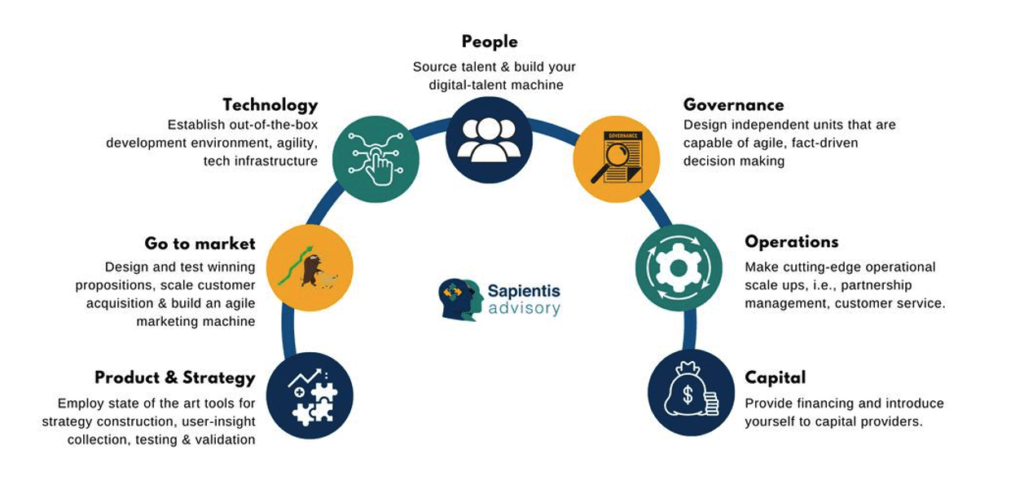Committing Talent
Talent is the key ingredient in any corporate endeavour. In the global survey, successful new businesses were more than twice as likely as underperformers to have top-tier talent and to deploy them in critical roles. Furthermore, these companies invested in talent from the outset.
Successful new businesses were almost twice as likely as under-performers to employ 20 or more people on launch, and almost two times as likely to employ 80 or more people.
Talent and capabilities are closely interrelated. The companies of nearly all respondents had a substantial need to improve their business-building skills and they cited a wide range of talent gaps, especially digital ones.
The largest number of responses cited:
- The design of the user experience and user interface as a gap.
- Modern IT and data architectures and digital marketing and sales came next
Followed lastly, by agile operations.
A clear strategy and a structured process
As the earlier discussion of customers and markets indicates, the top agenda item for leading business builders is strategy.
A rigorous approach to the entire business-building process, from initial brainstorming to scaling, is important. A company like Sapientis Advisory can source and place experts like Hannes who is a business turnaround, optimisation and strategy specialist to assist you. Of the companies that successfully scaled up new businesses:
- 47% reported having clear processes in place for the whole journey.
- 25% failed to scale their new businesses successfully.
In our experience, it is critical to channel the early excitement of business building into structured milestones and deliverables, with a sprint pace that supports rapid progress.
All too often, for example, there is an expectation from parent companies for new companies to break even in a few months which rarely ever happens, even in a fast-moving, agile world.
Companies that are subject to this kind of impatience, risk pulling the plug too quickly. Some businesses that are unprofitable at the six-month mark nonetheless scale up thereafter, while others continue on a path to oblivion.
To successfully identify scalable new businesses, look to more midstream metrics, which are less likely to be financial than customer based. Steer clear of vanity metrics, such as share of voice or traffic, and resist the temptation to pour money into marketing to, in effect, buying customers. Look instead at their lifetime value, which should be greater than or equal to twice the cost of acquiring them.
New businesses risk flaming out when they try to scale if customers do not value the product enough.
Avoiding the seven most common challenges that threaten scale
In another article entitled: The big boost: How incumbents successfully scale their new businesses, experience and analysis showed that successful corporate-backed start-ups follow a precise toolkit that covers seven areas (Figure 1). At a first glance, the seven areas are not unexpected and are likely on the agenda of each corporate-sponsored venture.
The difference between successes and failures, however, lies in the ability to reach gateway levels of proficiency in all of the seven areas. We have seen new corporate-backed businesses fail to scale when they have performed well in five areas but not in the other two. Even within a given area, failure in a single area can be enough to torpedo the entire venture’s ambitions for scale.
Figure 1: Successful corporate-backed startups follow a specific toolkit that covers seven areas.

A company like Sapientis Advisory can minimise your business scaling failures by assisting you to reach proficiency in all seven areas.
To be realistic, business scaling is difficult. It requires focus, determination, and discipline. But most important, it requires a commitment to the customer and the humility to understand that early success does not necessarily translate into future success. Success needs to be continuously earned.
In Summary
Business building has soared to the top of the corporate agenda. It provides growth, regardless of whether your company must diversify its revenues, increase its organic growth, parry disruption, or rapidly meet the changing needs of its old and new customers.
But to launch and scale new businesses, companies must consciously develop new capabilities: structuring, leading and staffing the new venture. They must build a deep, varied understanding of the market opportunity and create a successful strategy for the long-term, profitable acquisition of customers. A company like Sapientis Advisory can source and provide experts like Hannes who can assist you with all your business scaling needs.
Business building offers a unique opportunity to companies: the chance to combine a start-up’s agility and rapid growth potential with the resources and wisdom of an established company.
That is a powerful combination.
References


